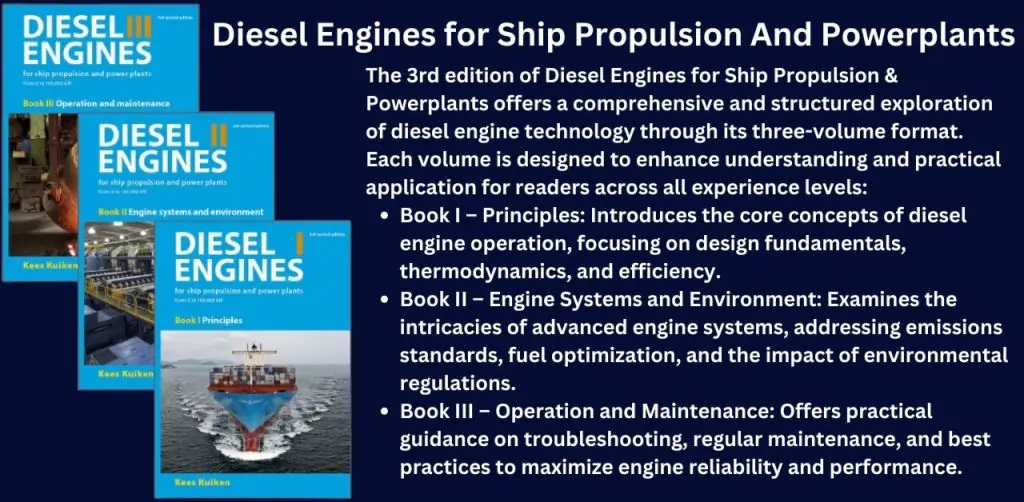Diesel Engines for Ship Propulsion And Powerplants
In the dynamic world of maritime operations, diesel engines are the heart of ship propulsion and power generation. The 3rd edition of Diesel Engines for Ship Propulsion & Powerplants stands out as a definitive resource for professionals and students alike. Designed to address the diverse needs of maritime training institutes, maintenance experts, shipping companies, and engine manufacturers, this comprehensive guide bridges the gap between foundational knowledge and advanced industry practices.
Whether you’re a seasoned engineer seeking the latest advancements or a student beginning your maritime journey, this book offers valuable insights, practical knowledge, and real-world applications to help you excel in the field of diesel engine technology.
What’s Inside the Guide?
The 3rd edition of Diesel Engines for Ship Propulsion & Powerplants offers a comprehensive and structured exploration of diesel engine technology through its three-volume format. Each volume is designed to enhance understanding and practical application for readers across all experience levels:
- Book I – Principles: Introduces the core concepts of diesel engine operation, focusing on design fundamentals, thermodynamics, and efficiency.
- Book II – Engine Systems and Environment: Examines the intricacies of advanced engine systems, addressing emissions standards, fuel optimization, and the impact of environmental regulations.
- Book III – Operation and Maintenance: Offers practical guidance on troubleshooting, regular maintenance, and best practices to maximize engine reliability and performance.
With its detailed illustrations, clear explanations, and real-world examples, this series equips maritime professionals and students with the knowledge they need to excel in diesel engine operation, systems management, and sustainable practices.
Key Topics Covered
The 3rd edition of Diesel Engines for Ship Propulsion & Powerplants dives deep into essential and advanced topics in diesel engine technology, making it a must-have for professionals and students alike. Key areas include:
- Common-Rail Systems: Explore the advancements in fuel injection technology for improved performance and efficiency.
- Dual-Fuel Engines: Delve into the design, functionality, and benefits of engines utilizing multiple fuel types.
- Emissions Standards: Understand the latest global regulations and their impact on maritime diesel engines.
- Material Science: Gain insights into casting, forging, and the materials used to manufacture critical engine components.
- Vibration Analysis and Propeller Dynamics: Learn about the challenges and solutions to vibration and propeller-related performance issues.
- Fuel-Related Problems: Address common challenges in fuel quality and compatibility, along with solutions for optimal engine operation.
- Reconditioning Practices: Discover techniques to enhance engine longevity and maintain peak performance.
- Testing Regulations: Stay informed on compliance standards and testing methods for diesel engine efficiency and reliability.
Why This Edition Stands Out
The 3rd edition of Diesel Engines for Ship Propulsion & Powerplants sets itself apart as an authoritative and practical resource, thanks to its unique features:
- Practical Approach: Complex concepts are demystified with detailed illustrations, authentic graphics, and concise explanations, allowing readers to grasp key information effortlessly.
- Industry Expertise: Created with contributions from top-tier companies, academic institutions, and industry experts, this book bridges the gap between theory and real-world application.
- Up-to-Date Information: Covers the latest advancements in diesel engine technology, including emissions standards, dual-fuel engines, and cutting-edge propulsion systems, ensuring compliance with modern regulations.
For Whom Is This Book?
The 3rd edition of Diesel Engines for Ship Propulsion & Powerplants is a vital resource tailored to meet the needs of diverse professionals across the maritime and power generation industries:
- Maritime Training Institutes and Universities: Ideal for educators and students building foundational and advanced knowledge of diesel engine systems.
- Maintenance and Reconditioning Specialists: Provides detailed insights into troubleshooting, reconditioning techniques, and best practices.
- Shipping Companies: Supports deep-sea, inland, dredging, towage, and heavy-load cargo operations by addressing propulsion and power generation challenges.
- Insurance Companies, Surveyors, and Classification Bureaus: Offers clarity on regulations, testing standards, and failure analysis for informed decision-making.
- Suppliers of Engine Parts, Fuel, and Lubricating Oil: Guides understanding of engine systems to optimize product offerings and enhance service quality.
- Diesel Engine Manufacturers and Power Plant Operators: Serves as a reference for innovation, operational efficiency, and adherence to environmental standards.
Source of Availability
This essential guide is available through leading technical bookstores and online retailers. Purchase your copy from:
Equip yourself with the knowledge and tools to master diesel engine operation and maintenance with this indispensable resource.
FAQs: Diesel Engines for Ship Propulsion & Powerplants
Q. What does this book cover?
Ans. It covers diesel engine principles, systems, maintenance, and environmental standards.
Q. Who is this book for?
Ans. It’s for maritime professionals, shipping companies, maintenance teams, and students.
Q. What’s new in the 3rd edition?
Ans. Updates include common-rail systems, dual-fuel engines, emissions, and reconditioning.
Q. Where can I buy this book?
Ans. The book is available on major online bookstores like Amazon.
Conclusion
Whether you’re a seasoned professional or a student stepping into the maritime field, Diesel Engines for Ship Propulsion & Powerplants (3rd Edition) is your go-to resource. With its blend of theory, practical insights, and industry expertise, this book equips you with the knowledge to excel in diesel engine operation, maintenance, and innovation.

